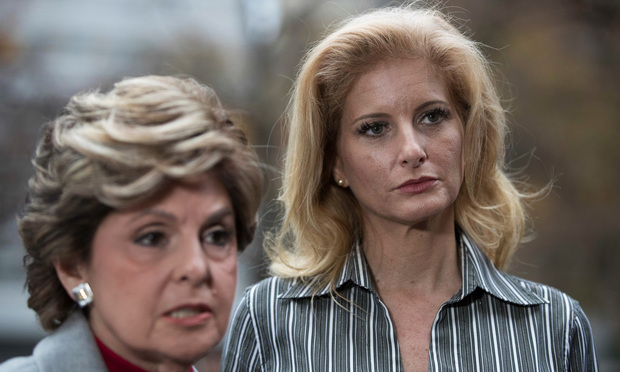Manhattan Appeals Court to Mull Whether Trump Must Face Ex-'Apprentice' Contestant's Defamation Suit While in Office
Whether a former contestant on "The Apprentice" will have to wait until President Donald Trump is out of office to hale him in to court in her defamation lawsuit is expected to be the central issue before a Manhattan appeals court on Thursday afternoon when it is set to hear arguments in the case.
October 16, 2018 at 06:06 PM
7 minute read
 Summer Zervos (right) with attorney Gloria Allred. Photo credit: Mary Altaffer/AP
Summer Zervos (right) with attorney Gloria Allred. Photo credit: Mary Altaffer/AP
Whether a former contestant on “The Apprentice” will have to wait until President Donald Trump is out of office to hale him in to court in her defamation lawsuit is expected to be the central issue before a Manhattan appeals court on Thursday afternoon when it is set to hear arguments in the case.
Trump's lawyers are set to argue before the Appellate Division, First Department, that Summer Zervos—who said Trump subjected her to unwanted kissing and groping in 2007 and whose lawsuit says he defamed her by calling her a liar during the 2016 election campaign—may not litigate her case while he is in office.
Zervos' legal team is prepared to say she may sue over Trump's non-official conduct, and has said that his status as president “does not place him above the law.”
They have also disputed Trump's argument that his statements in campaign speeches and on Twitter denying allegations of sexual misconduct should be considered mere opinion, without defamatory meaning.
“His brutalizing of her a second time—this time falsely condemning her to the world as a liar for having the temerity to reveal his earlier unwanted sexual groping of her body—directly caused serious injury,” said Zervos' lead counsel, New York-based Cuti Hecker Wang partner Mariann Meier Wang, in court papers.
Wang said that, following Trump's statements that his accusers lied to hurt his campaign, Zervos, a California restaurateur, has received threats of violence against her and her business.
Zervos' legal team also includes Cuti Hecker attorneys John Cuti, Eric Hecker, Daniel Mullkoff and Heather Gregorio.
Trump's lawyers seek to overturn a ruling in March by Manhattan Supreme Court Justice Jennifer Schecter to deny a motion to dismiss, finding nothing in the supremacy clause of the U.S. Constitution that precludes the president from getting sued in state court and that Trump's remarks regarding his accusers could be proven true or false.
In court papers, Marc Kasowitz of Kasowitz Torres Benson in New York, a longtime lawyer for the Trump family who is working as lead defense counsel in the Zervos case, argues that allowing “politically motivated” lawsuits like Zervos' to move forward may create “intolerable burdens” for the president and that, even if Trump's statements could be interpreted as calling Zervos a liar, a reasonable audience would understand that his statements were opinions.
“As a matter of fundamental First Amendment principles, when heated political campaign speech is involved, a reasonable audience would view it as part of a free, robust, even nasty political discourse, rather than defamatory statements of fact,” Kasowitz wrote.
Trump's defense team also includes Kasowitz Benson Torres attorneys Christine Montenegro and Paul Burgo.
In the fight regarding standing for Zervos to sue Trump in state court, the parties have little precedent to work with: the only case addressing the specific issue is President Bill Clinton's court battle with Paula Jones, who alleged that Clinton lured her to a hotel room in 1991 while he was still Arkansas governor and propositioned her to perform oral sex.
Jones sued Clinton for sexual harassment in 1994, more than one year after Clinton took power.
In 1997, the U.S. Supreme Court found that sitting presidents are not immune from suits filed in federal court, though it left open the question of whether or not the president could be targeted with state court actions, ruling that a lawsuit filed in state court might present a more compelling case for presidential immunity.
Clinton eventually agreed to a $850,000 settlement in the case that included no acknowledgment of wrongdoing.
The First Department has already dealt a setback to the Trump team in the Zervos case; in May, the court denied Trump's bid to stay the case until he has left office, and the Court of Appeals declined to hear the case, leaving the First Department's ruling intact.
Clinton was also unsuccessful in his effort to delay the proceedings in the Jones case.
However, Trump's argument that statements he made during the public mudslinging in the months leading up to the 2016 presidential election should be considered opinion has proven to be a viable defense against defamation claims.
Political commentator Cheryl Jacobus, who says she was turned down for a job with the Trump campaign, sued Trump for defamation in 2016 while he was still a candidate after he responded to criticism from Jacobus by taking to Twitter and calling her a “real dummy” who “begged” him for a job.
Manhattan Supreme Court Justice Barbara Jaffe tossed out Jacobus' suit, finding that Trump's statements amounted to campaign rhetoric, that Trump's tweets about Jacobus had a defensive tone and that comments published through social would be more likely to be understood as opinion rather than fact.
The First Department upheld Jaffe's ruling on appeal and the Court of Appeals denied cert.
Jay Butterman of Butterman & Kahn, who represented Jacobus in the suit, said Zervos' case may fare better that Jacobus', given that the alleged defamation in the Zervos case includes tweets as well as statements from stump speeches.
But he isn't overly optimistic. Butterman said that New York libel law is generally favorable for defendants, that the courts seem to view Twitter as a “libel-free zone” and that some courts have allowed First Amendment to be used by powerful individuals to lash out at critics.
“If the doors of the courthouse are closed to every person who was not just simply denigrated but damaged by Donald Trump, then we have carved out a completely free ability for any individual to simply ruin whoever he thinks needs to be ruined,” Butterman said.
Lawrence Rosen of LaRocca Hornik Rosen Greenberg & Blaha, who defended Trump in the Jacobus case, responded that the courts that ruled in the case concluded that the alleged defamatory words were opinion speech and hyperbole, and that the courts performed a traditional defamation analysis, which included the context in which the statements were made—in this case, the heated back-and-forth political debates associated with the campaign.
“Ms. Jacobus was very critical of then candidate Trump on the air,” Rosen said. “Mr. Trump responded to these attacks with his own opinions as to her motivations for criticizing him, which the court found to be protected speech and not defamatory.”
Read more:
Ex-'Apprentice' Contestant Argues She Needs Info on Other Trump Accusers in Defamation Suit
Trump Pushes Back on Ex-'Apprentice' Contestant's Effort to Get Info About More Accusers
Trump Attorneys Claim Political Bias in Effort to Dismiss Trump Foundation Lawsuit
This content has been archived. It is available through our partners, LexisNexis® and Bloomberg Law.
To view this content, please continue to their sites.
Not a Lexis Subscriber?
Subscribe Now
Not a Bloomberg Law Subscriber?
Subscribe Now
NOT FOR REPRINT
© 2025 ALM Global, LLC, All Rights Reserved. Request academic re-use from www.copyright.com. All other uses, submit a request to [email protected]. For more information visit Asset & Logo Licensing.
You Might Like
View All

Family Law Practitioners Weigh In on Court System's New Joint Divorce Program

Former NY City Hall Official Tied to Adams Corruption Probe to Plead Guilty

New Charges Expected in Sex Trafficking Case Against Broker Brothers
Trending Stories
- 1Ex-Starbucks GC Exiting Latest Role, Will Get Severance
- 2Family Law Special Section 2025
- 3We Must Uphold the Rights of Immigrant Students
- 4Orrick Picks Up 13-Lawyer Tech, VC Group From Gunderson Dettmer
- 5How Alzheimer’s and Other Cognitive Diseases Affect Guardianship, POAs and Estate Planning
Who Got The Work
J. Brugh Lower of Gibbons has entered an appearance for industrial equipment supplier Devco Corporation in a pending trademark infringement lawsuit. The suit, accusing the defendant of selling knock-off Graco products, was filed Dec. 18 in New Jersey District Court by Rivkin Radler on behalf of Graco Inc. and Graco Minnesota. The case, assigned to U.S. District Judge Zahid N. Quraishi, is 3:24-cv-11294, Graco Inc. et al v. Devco Corporation.
Who Got The Work
Rebecca Maller-Stein and Kent A. Yalowitz of Arnold & Porter Kaye Scholer have entered their appearances for Hanaco Venture Capital and its executives, Lior Prosor and David Frankel, in a pending securities lawsuit. The action, filed on Dec. 24 in New York Southern District Court by Zell, Aron & Co. on behalf of Goldeneye Advisors, accuses the defendants of negligently and fraudulently managing the plaintiff's $1 million investment. The case, assigned to U.S. District Judge Vernon S. Broderick, is 1:24-cv-09918, Goldeneye Advisors, LLC v. Hanaco Venture Capital, Ltd. et al.
Who Got The Work
Attorneys from A&O Shearman has stepped in as defense counsel for Toronto-Dominion Bank and other defendants in a pending securities class action. The suit, filed Dec. 11 in New York Southern District Court by Bleichmar Fonti & Auld, accuses the defendants of concealing the bank's 'pervasive' deficiencies in regards to its compliance with the Bank Secrecy Act and the quality of its anti-money laundering controls. The case, assigned to U.S. District Judge Arun Subramanian, is 1:24-cv-09445, Gonzalez v. The Toronto-Dominion Bank et al.
Who Got The Work
Crown Castle International, a Pennsylvania company providing shared communications infrastructure, has turned to Luke D. Wolf of Gordon Rees Scully Mansukhani to fend off a pending breach-of-contract lawsuit. The court action, filed Nov. 25 in Michigan Eastern District Court by Hooper Hathaway PC on behalf of The Town Residences LLC, accuses Crown Castle of failing to transfer approximately $30,000 in utility payments from T-Mobile in breach of a roof-top lease and assignment agreement. The case, assigned to U.S. District Judge Susan K. Declercq, is 2:24-cv-13131, The Town Residences LLC v. T-Mobile US, Inc. et al.
Who Got The Work
Wilfred P. Coronato and Daniel M. Schwartz of McCarter & English have stepped in as defense counsel to Electrolux Home Products Inc. in a pending product liability lawsuit. The court action, filed Nov. 26 in New York Eastern District Court by Poulos Lopiccolo PC and Nagel Rice LLP on behalf of David Stern, alleges that the defendant's refrigerators’ drawers and shelving repeatedly break and fall apart within months after purchase. The case, assigned to U.S. District Judge Joan M. Azrack, is 2:24-cv-08204, Stern v. Electrolux Home Products, Inc.
Featured Firms
Law Offices of Gary Martin Hays & Associates, P.C.
(470) 294-1674
Law Offices of Mark E. Salomone
(857) 444-6468
Smith & Hassler
(713) 739-1250






